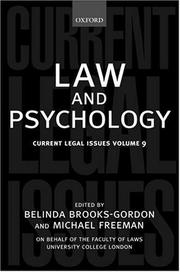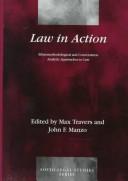| Listing 1 - 10 of 22 | << page >> |
Sort by
|

ISBN: 0199211396 9780199211395 Year: 2006 Volume: 9 Publisher: Oxford : Oxford university press,
Abstract | Keywords | Export | Availability | Bookmark
 Loading...
Loading...Choose an application
- Reference Manager
- EndNote
- RefWorks (Direct export to RefWorks)
Current Legal Issues, like its sister volume Current Legal Problems, is based upon an annual colloquium held at University College London. Each year, leading scholars from around the world gather to discuss the relationship between law and another discipline of thought. Each colloqium examines how the external discipline is conceived in legal thought and argument, how the law is pictured in that discipline, and analyzes points of controversy in the use, and abuse of extra-legal arguments within legal theory and practice. Law and Psychology, the latest volume in the Current Legal Issues series, contains a broad range of essays by scholars interested in the interactions between law and psychology. The volume includes studies of jury trials in terrorism cases, psychological evidence in family law cases, child witness testimony and the role of psychology in punishment theory.
Law --- Psychological aspects --- Psychological aspects. --- Law - Psychological aspects
Book
ISBN: 0471903361 9780471903369 Year: 1984 Publisher: Chichester : Wiley,
Abstract | Keywords | Export | Availability | Bookmark
 Loading...
Loading...Choose an application
- Reference Manager
- EndNote
- RefWorks (Direct export to RefWorks)
Psychology, Forensic --- Law --- Congresses --- Psychological aspects --- Forensic psychology --- Psychology, Forensic - Congresses --- Law - Psychological aspects - Congresses --- Law - Congresses
Book
ISBN: 9780199859177 0199859175 Year: 2013 Publisher: Oxford ; New York : Oxford University Press,
Abstract | Keywords | Export | Availability | Bookmark
 Loading...
Loading...Choose an application
- Reference Manager
- EndNote
- RefWorks (Direct export to RefWorks)
Criminal law --- Forensic neurology --- Neurosciences --- Criminal psychology --- Psychological aspects --- Criminal psychology. --- Forensic neurology. --- Neurosciences. --- Psychological aspects. --- Criminal law - Psychological aspects
Book
ISBN: 0951379364 9780951379363 Year: 1995 Volume: 4 Publisher: Liverpool Charles
Abstract | Keywords | Export | Availability | Bookmark
 Loading...
Loading...Choose an application
- Reference Manager
- EndNote
- RefWorks (Direct export to RefWorks)
Law --- Semiotics (Law) --- Psychological aspects --- -Semiotics (Law) --- Acts, Legislative --- Enactments, Legislative --- Laws (Statutes) --- Legislative acts --- Legislative enactments --- Jurisprudence --- Legislation --- Law - Psychological aspects
Book
ISBN: 1316792293 1316792773 1316793257 1316795179 1316793737 1316493024 1107140706 1316794695 9781107140707 1316789411 9781316493021 Year: 2016 Publisher: New York, N.Y. Cambridge University Press
Abstract | Keywords | Export | Availability | Bookmark
 Loading...
Loading...Choose an application
- Reference Manager
- EndNote
- RefWorks (Direct export to RefWorks)
In recent years, 'Nudge Units' or 'Behavioral Insights Teams' have been created in the United States, the United Kingdom, Germany, and other nations. All over the world, public officials are using the behavioral sciences to protect the environment, promote employment and economic growth, reduce poverty, and increase national security. In this book, Cass R. Sunstein, the eminent legal scholar and best-selling co-author of Nudge, breaks new ground with a deep yet highly readable investigation into the ethical issues surrounding nudges, choice architecture, and mandates, addressing such issues as welfare, autonomy, self-government, dignity, manipulation, and the constraints and responsibilities of an ethical state. Complementing the ethical discussion, The Ethics of Influence: Government in the Age of Behavioral Science contains a wealth of new data on people's attitudes towards a broad range of nudges, choice architecture, and mandates.

ISBN: 0520089901 0585119767 9780520089907 Year: 1995 Volume: 3 Publisher: Berkeley : University of California Press,
Abstract | Keywords | Export | Availability | Bookmark
 Loading...
Loading...Choose an application
- Reference Manager
- EndNote
- RefWorks (Direct export to RefWorks)
Lawyers --- Law --- Jurisprudence --- Droit /et Psychologie --- --Juriste --- --Psychologie --- --Psychology --- History --- Psychological aspects --- 190 --- History. --- Psychology --- --Droit --- Law, Politics & Government --- Law, General & Comparative --- Lawyers - Psychology - History --- Law - Psychological aspects - History --- Jurisprudence - Psychological aspects - History --- Juriste --- Psychologie --- Droit

ISBN: 0471926639 9780471926634 Year: 1992 Volume: vol *2 Publisher: Chichester Wiley
Abstract | Keywords | Export | Availability | Bookmark
 Loading...
Loading...Choose an application
- Reference Manager
- EndNote
- RefWorks (Direct export to RefWorks)
Témoignage --- --Aveu --- --Psychologie --- --Police questioning --- Confession (Law) --- Psychological aspects --- 343.95 --- Criminologische psychologie. Forensische psychologie --- Police questioning --- Psychological aspects. --- 343.95 Criminologische psychologie. Forensische psychologie --- Police interrogation --- Criminal investigation --- Questioning --- Interviewing in law enforcement --- Criminal procedure --- Evidence, Criminal --- Evidence (Law) --- Great Britain --- Police questioning - Psychological aspects. --- Confession (Law) - Psychological aspects. --- Confession (Law) - Great Britain. --- Aveu --- Psychologie --- Police questioning - Psychological aspects --- Confession (Law) - Psychological aspects --- Confession (Law) - Great Britain

ISBN: 184014078X 1351922734 1315250667 9781315250663 1138250163 9781351922715 9781138250161 9781840140781 1351922726 Year: 1997 Publisher: Aldershot Ashgate
Abstract | Keywords | Export | Availability | Bookmark
 Loading...
Loading...Choose an application
- Reference Manager
- EndNote
- RefWorks (Direct export to RefWorks)
Ethnomethodologists and Conversation Analysts have always been interested in the study of law and legal institutions and there is now a large body of empirical studies, representing a range of analytic traditions in each field. This collection introduces this literature and the research questions pursued by ethnomethodologists and conversation analysts, in an accessible form to a general audience in the inter-disciplinary field of law and society studies.
Sociology of law --- Sociological jurisprudence --- Law --- Psychological aspects --- Sociological jurisprudence. --- Psychological aspects. --- Juridical psychology --- Juristic psychology --- Legal psychology --- Psychology, Juridical --- Psychology, Juristic --- Psychology, Legal --- Psychology, Applied --- Therapeutic jurisprudence --- Law and society --- Society and law --- Jurisprudence --- Sociology --- Law and the social sciences --- Psychology --- Law - Psychological aspects
Book
ISBN: 9780415949736 9780415949743 9780203868980 9781135253233 9781135253271 9781135253288 0415949742 Year: 2010 Publisher: London Routledge
Abstract | Keywords | Export | Availability | Bookmark
 Loading...
Loading...Choose an application
- Reference Manager
- EndNote
- RefWorks (Direct export to RefWorks)
Relying on historical examples of successfully implanted constitution regimes, Michel Rosenfeld sheds light on the range of conditions necessary for the emergence, continuity and adaptability of a viable constitutional identity. The last fifty years has seen a worldwide trend toward constitutional democracy. But can constitutionalism become truly global? Relying on historical examples of successfully implanted constitutional regimes, ranging from the older experiences in the United States and France to the relatively recent ones in Germany, Spain and South Africa, Michel Rosenfeld sheds light on the range of conditions necessary for the emergence, continuity and adaptability of a viable constitutional identity - citizenship, nationalism, multiculturalism, and human rights being important elements. The Identity of the Constitutional Subject is the first systematic analysis of the concept, drawing on philosophy, psychoanalysis, political theory and law from a comparative perspective to explore the relationship between the ideal of constitutionalism and the need to construct a common constitutional identity that is distinct from national, cultural, ethnic or religious identity. The Identity of the Constitutional Subject will be of interest to students and scholars in law, legal and political philosophy, political science, multicultural studies, international relations and US politics.
Public law. Constitutional law --- Legal theory and methods. Philosophy of law --- Constitutional law --- Citizenship --- Psychological aspects. --- Social aspects. --- Philosophy. --- Constitutional limitations --- Constitutionalism --- Constitutions --- Limitations, Constitutional --- Public law --- Administrative law --- Philosophy --- Psychological aspects --- Social aspects --- Interpretation and construction --- Constitutional law - Psychological aspects. --- Constitutional law - Social aspects. --- Constitutional law - Philosophy. --- Citizenship - Philosophy.
Book
ISBN: 9026509774 9789026509773 Year: 1988 Volume: 1 Publisher: Amsterdam Swets en Zeitlinger
Abstract | Keywords | Export | Availability | Bookmark
 Loading...
Loading...Choose an application
- Reference Manager
- EndNote
- RefWorks (Direct export to RefWorks)
Law --- Psychology --- Psychology, Forensic --- Psychological aspects --- -Psychology, Forensic --- Juridical psychology --- Juristic psychology --- Legal psychology --- Forensic sciences --- Psychology, Applied --- Acts, Legislative --- Enactments, Legislative --- Laws (Statutes) --- Legislative acts --- Legislative enactments --- Jurisprudence --- Legislation --- Forensic psychology --- Psychology, Juridical --- Psychology, Juristic --- Psychology, Legal --- Therapeutic jurisprudence --- Law - Psychological aspects
| Listing 1 - 10 of 22 | << page >> |
Sort by
|

 Search
Search Feedback
Feedback About UniCat
About UniCat  Help
Help News
News